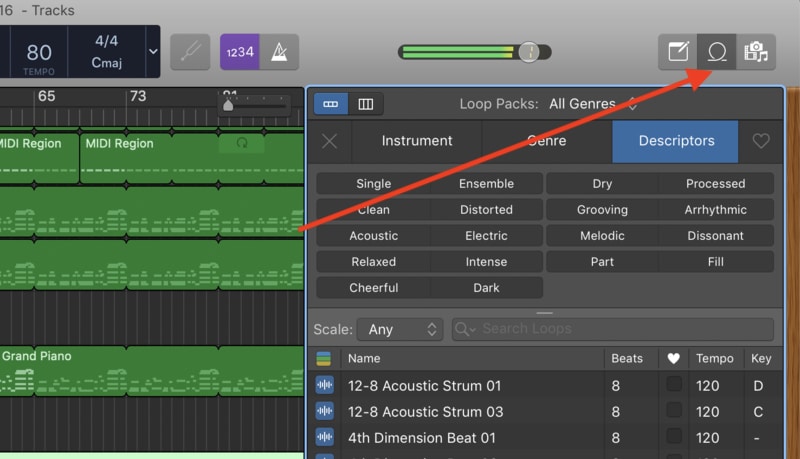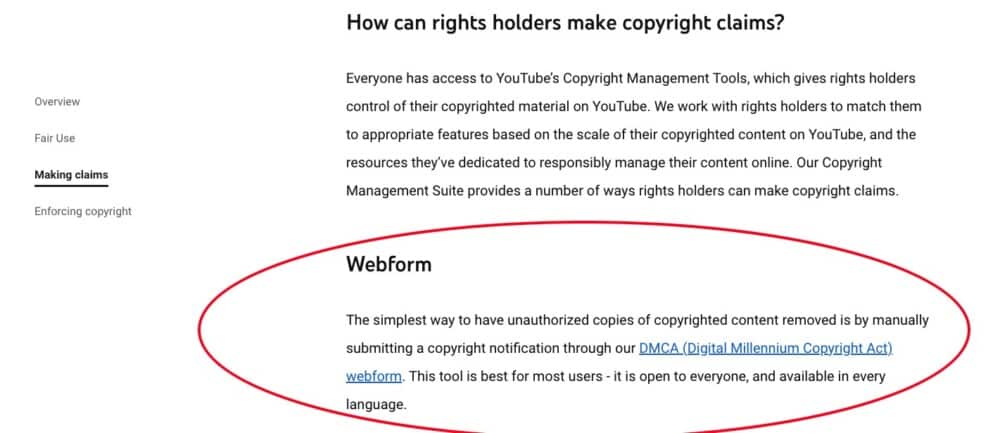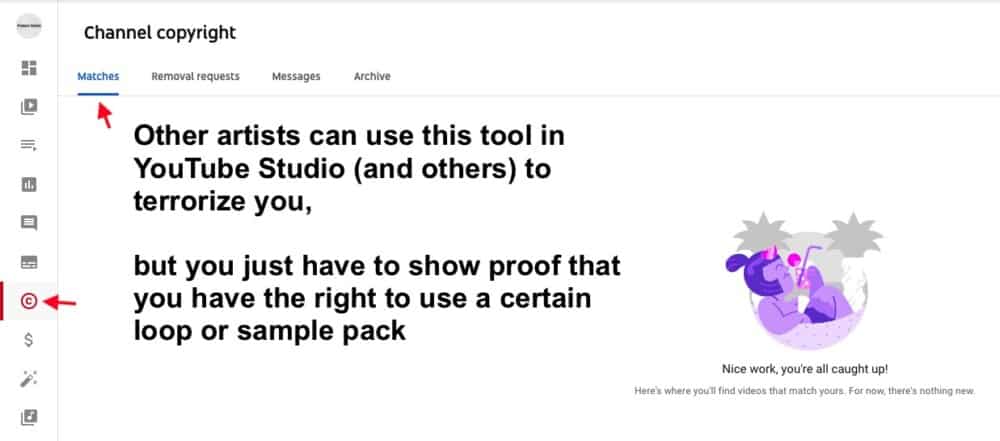You can publish songs made in GarageBand because using the DAW doesn’t sacrifice your rights as a creator, moreover, all the sounds and samples are legal to use on a royalty-free basis as long as you don’t try to sell the loops and sounds on their own.
When you purchase loops from a 3rd party, they may come with the same type of user agreement. As long as you make something original from the loops that you purchased, you can use them and publish them.
While purchasing loops and sample packs can be a little bit more unclear, if you get them from Loopmasters, you won’t have any problems because all of the loops and sounds are licensed on a non-exclusive basis. Check out what their customer service rep had to say about this below:

Why You Can Publish Songs Made in Garageband
1) The Software Agreement Explicitly Says You Can

GarageBand is a Digital Audio Workstation, and like any other DAW, it’s the medium in which music is created. In other words, the DAW itself isn’t what is creating the original sounds and songs; it’s the user behind it. If you were using the industry-standard DAW, ProTools, you could publish a song created with that software and GarageBand is no different.
A useful analogy could be a guitar. For example, if you write a song using a PRS SE Custom 24, Paul Reed Smith doesn’t own the copyright of what you created, because the guitar was just the tool that you used to make the song. A DAW is the same.
A DAW is just an editing and creative tool in which you can create and manipulate audio in whatever way you choose. The companies who create these tools can’t say they own whatever you make with their software, because that would be straight up ridiculous.
2) When Purchasing an Apple Device, You Also Purchase All the Samples and Loops that Come with GarageBand

Whenever you buy a new Apple product it comes with the right to download Garageband as well as all of the loops and samples that come with it.
The agreement which can be found here explicitly states that you are free to use any samples, loops, or sounds included in GarageBand, as long you don’t sell them on a stand-alone basis.
There will be no legal repercussions if you use them to create a song for commercial purposes which I’ve argued before in my sampling guide.
As it was just stated, you cannot, however, take individual samples or sounds and sell them on their own. Familiarize yourself with the agreement above if you have not yet, but I’ve summarized the fundamental points here.
When Publishing Content With Samples And Loops Causes Problems
1) When the Content ID System Picks Up Samples And Loops

Like Brandon from Loopmasters pointed out in the image I showed above, YouTube’s Content ID system can sometimes pick up loops and samples in a producer’s song when it has been used before in someone else’s work.
This means there is a chance your song could be taken down or could be designated as not suitable for monetization via third-party ads which is just another reason why I recommend making your own using my guide.
However, as Brandon also pointed out, if you ran into this problem, you would just have to include proof of your right to use the samples and loops when filing a counterclaim. For a lot of artists, this is all they’ll have to do to get YouTube to bring their content back onto the platform or make it suitable for advertisers.
There is a digital code for every song that has a copyright and is uploaded into a database. Some apps can pick it up with reading software, like how Shazam picks up songs so quickly; it’s the song’s virtual barcode. YouTube works the same way when it reads the song after it has finished downloading.
2) When Other Artists File A Copyright Claim Against Your Content

While it may seem hard to believe, there are nefarious actors who will see that you used the same loop or sample pack as them, and then choose to file a claim against you via a DMCA takedown or through YouTube’s copyright strike platform.
These sneaky individuals can make the claim that you’re using the same content as them, because technically you are, but there is no legal merit to this at all.
Like Brandon said, loops are often sold on a royalty-free and non-exclusive basis, which means the user is paying for the right to use the sound but the person doesn’t necessarily own the sound.
And this makes total sense, because think about it: how could everyone own the “exclusive right” to the sound when it has been sold to so many different people?
How Copyright Laws Apply To Your GarageBand Creations
The law is in your favor when it comes to being a creator. The moment you create something, it’s yours, and it’s as simple as that. According to Copyright Laws, when you create something in a “fixed and tangible” form, it’s yours.
If you were to sue someone over copyright infringement, you would need some kind of proof that you came up with the content before the infringing party and vice versa if someone was to sue you.
In fact, I’ve discussed this at length before. It’s always a good idea to register your work with the United States Copyright Office whenever possible, especially if you’ve gotten yourself to a point where you have a large body of work that needs protection.
To do this, you have to register your files with the United States Copyright Office and the video shown down below will walk you through this process:
For a small fee, they keep written, audio, or visual components on file, for up to 120 years approximately. After that, anyone can use them without the permission of the registrar.
To do this, go to eco.copyright.gov and follow the directions to copyright up to 10 unpublished works on the same application. I walked you through this process in the article I linked above.
Here’s another great article explaining the length of time a song has before it becomes public domain. Generally, 70 to 120 years after being published or after the author has died.
There are many cases where a song from over 100 years has been implemented into modern music. As long as the copyright is out of date, the song can be used by anyone.
There is a lot of misinformation and hysteria spread by people online and it’s no different on the musical side of things either (it’s not just politics).
At the end of the day, if you’re using loops and samples that you’ve paid for from a legitimate source, you won’t have any problems other than minor inconveniences.
As you become more and more successful, however, you’ll become more visible and not to just fans and people who appreciate your work, but to the n’er do wells too, so it’s not a bad idea to understand the best way to protect yourself.
Can You Use Apple Loops on a YouTube Video?

You can use any Apple Loops in YouTube videos (my guide) because it doesn’t violate the software agreement. The free loops that come with the program can be used to create anything you want with them as long as you don’t sell them on their own.
This agreement is to protect Apple and its ability to add an excellent library for people to use without having to worry.
There is an important caveat however, but it’s unrelated to Apple’s legal agreement. It has more to do with the rules of other platforms. While you certainly can use Apple Loops in a YouTube video, there have been cases where the creator wasn’t able to monetize the video due to YouTube’s content ID system, so keep that in mind.
This article from CDBaby, a music distributor that many musicians use to distribute their music globally, describes all of the situations that make your music ineligible for monetization on platforms like YouTube and Facebook.
Because you do not have the “exclusive” rights to the GarageBand loops, it’s possible that you will not be able to monetize them on YouTube in any video, but you can still add them if your goal is not to monetize the song.
You can always try and find online loops and samples to import into GarageBand that will give you exclusive rights, but if they don’t, you’ll be in the same boat with the GarageBand loops in the sense that they’ll probably get flagged.
Too many flags can eventually hurt your YouTube account, so it may be best to purchase exclusive rights to loops you want to use. YouTube is swift to catch anyone trying to use a song that is not their own.
They allow you to make a description and allow you to credit the proper sources, but they will do it for you if you fail. It’s automated, and it’s also used on recorded live performances.
Facebook now gives you limited broadcasting capabilities when it comes to covering a song, so nowadays, online cover songs and stolen music doesn’t make it very far towards monetization at all.
In other words, it may just be wiser to use your own creations, or, at least have an understanding that third-party advertiser monetization is limited if you’re using other people’s work (even if you paid for it).
With that being said, this isn’t a hard set rule because many videos that have paid-for loops and samples can still be monetized. Just tread carefully and make sure you’ve purchased the right sample pack with the appropriate rights and privileges.
Instances Where People Have Been Sued For Copyright
Many bands have gone through lawsuits like this; think of Queen and Vanilla Ice, for instance. Vanilla Ice did take a part from Queen’s melody of “Under Pressure” for Ice Ice Baby but changed one note and won the case in their favor.
Led Zeppelin is notorious for stealing ideas, but their iconic song “Stairway To Heaven” was ruled in favor of Led Zeppelin in 2020 from a lawsuit that started in 1968 off a song from the band Spirit.
Both cases were in favor of the defendant, but that may not always be the case, and it could take years of litigation and lawyer fees to settle. That’s enough to keep most people from taking other’s ideas.
Additionally, even if you win the case, it’s a lose-lose situation in the end because years and years of time has been wasted in addition to massive lawyer costs.
Important Things to Note About Publishing Garageband Songs
1) It is Best to Consider Legal Counsel If You’re Unsure
I have laid out a lot of information for you to consider, but consider legal council if you are unsure of anything. Hiring a great entertainment lawyer can help save your music and money in the long run.
At any time, if you have failed to file for copyrights or publishing properly, you can experience consequences like cease and desist notice as well as lawsuits concerning what the plaintiff believes you owe them.
2) Music ID Will Protect Your Music From Being Stolen By Others
YouTube, Shazam, and other 3rd party distribution companies use a thing called Music ID to know when your song is playing so that it can generate revenue for you.
This is automatically done when you publish your songs on sites like CD Baby or other music licensing sites. Shazam, for instance, can pick up on a Music ID and show you the artist and other links associated with the artist. We’ve come a long way from only having an AM radio!
With a music ID, you are entitled to compensation whenever someone plays your song. Without Music ID, licensing companies cant pay you and don’t know when your song has been played.
It’s best to register your song and get paid than to wait and not get any revenue when the song is fresh and people are starting to listen to it.
3) Copyrights Will Save Your Music In The Long Run
If a piece of music has a copyright, you cannot play that song without infringing on the artist’s rights or the company that holds the copyright. Contrary to what a lot of people say online, it doesn’t matter how long the track is: 10 seconds or 2 minutes.
By law, using any material owned by someone else for your gain is copyright infringement and can lead to a lengthy and costly court bill.
4) Understanding the Designation, “Royalty-Free,” and How It is Used Under Copyright Laws
Royalty-free does not mean copyright free. It simply means you have the right to use the song or loop for whatever you want; you cannot, however, copyright it individually for monetary use.
If you are purchasing royalty-free music, make sure you understand your rights and how to use the sounds and loops you’ve purchased. Anything bought from Loopmasters can be used for commercial purposes.
5) Exclusive Rights and Royalty-Free Are Different
Royalty-free means you have rights to use the audio on the basis you create something original. On the other hand, exclusive rights means you can use the audio in any way you see fit. Understanding which rights you have will keep you out of a lawsuit and keep your music safe.
6) You Can Pay for Rights to Use Audio on a Unit-by-Unit Basis
To register a cover song or a song for which you do not possess the exclusive rights, it is common to pay a small fee for how many units you think you might sell, especially when sampling songs already copy-written and protected. To do this, you have to register the song on separate websites like Harry Fox or Song File.

 Written By :
Written By :